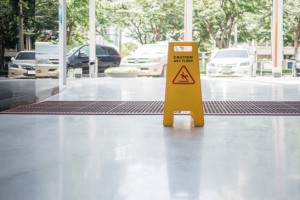Slip and Fall in Florida. Defining Reasonableness:
When considering whether or not you may have a slip and fall or trip and fall case in Florida, there are some things you should know.
Generally, in Florida, a property owner owes two duties to persons invited on the premises, such as business customers or social guests:
- The duty to use reasonable care in maintaining the property in a reasonably safe condition (i.e., free of dangers); and
- The duty to warn of concealed dangers which are known or should be known to the owner and which are unknown to the invitee, and cannot be discovered through the exercise of due care.
If the slip and fall or trip and fall occurs at a business establishment and is due to a substance (known in Florida legal talk as a “transitory foreign substance) on the floor, such as water, oil, food, etc., the claimant must prove the business establishment had actual or constructive knowledge (meaning “should have known”) of the dangerous condition and should have taken action to remedy it.
Constructive knowledge may be proven by circumstantial evidence showing that:
- The dangerous condition existed for such a length of time that, in the exercise of ordinary care, the business establishment should have known of the condition; or
- The condition occurred with regularity and was therefore foreseeable.
Do you need a slip and fall attorney? If you were injured due to a slip and fall or trip and fall, contact the Law Offices of Kerri C. Smith, P.A. today to learn about your rights.
The information on this website is for general information purposes only and is not intended to create an attorney-client relationship. Nothing on this site should be construed as legal advice for any individual case or situation.
